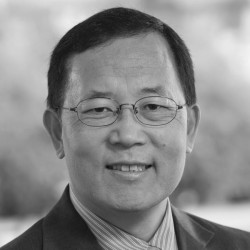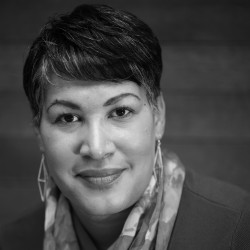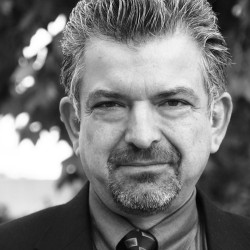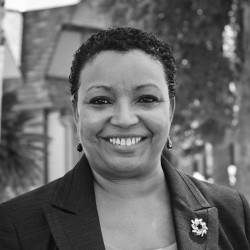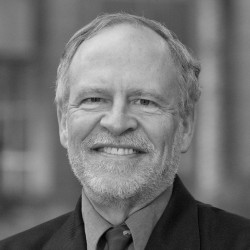 Joy Moore: While we’ve come together this evening to talk about unjust legacies, and we’ve come together to talk about the difficult conversation of race, privilege, and justice, I want to remind you that we don’t come here as experts talking at you. We come together as brothers and sisters in Christ. Our gathering together is the expectation that we come knowing that if we can name sin by the power of the Holy Spirit, and we can talk honestly about who we are and where we are, that together we can make a difference in the world. That’s the task of the church.
Joy Moore: While we’ve come together this evening to talk about unjust legacies, and we’ve come together to talk about the difficult conversation of race, privilege, and justice, I want to remind you that we don’t come here as experts talking at you. We come together as brothers and sisters in Christ. Our gathering together is the expectation that we come knowing that if we can name sin by the power of the Holy Spirit, and we can talk honestly about who we are and where we are, that together we can make a difference in the world. That’s the task of the church.
Some people would like to say we live in a post-racial society. Well, you can’t talk about being post-racial unless you first understand why we even call ourselves “racialized” in the first place. So, a bit of our conversation tonight will be difficult to hear. And I will tell you on behalf of the panelists, if it steps in your backyard or it steps on your toes, we’re all Christian brothers and sisters here. Do not shoot the messenger. Our expectation is to learn together, to grow together, to walk together, so that when we leave this place we might be a glimpse of God’s glory by being a counter-cultural community that is multiethnic, multicultural, but most of all, claims to be unashamedly and unapologetically Christian.
Our panelists are not merely talking about this in front of you. They’re living it in their lives. So, with open hearts to the Spirit of God speaking among us, let us embrace their words that we might be transformed to transform the world.
Juan Martínez: If you go to the National Palace in Guatemala City, Guatemala, now called the Palace of Cultures, there are a whole lot of large murals that purport to tell the story of Guatemala in the official version. At the very center of all of these murals is a Spanish soldier in full gear and a scantily clad indigenous woman together. That’s the official version of how Guatemala comes to be formed. In the background, you’ll see a priest giving catechism, you’ll see an indigenous person teaching the Spaniards how to plant corn, and, if you look really carefully, you’ll actually see a battle way, way in the background.
Every culture, every society, has people who are privileged and people who are not, and those in privilege get to tell the story. They get to decide how we tell the story. The part you don’t hear is when the National Palace was built by General Ubico, 3,900 indigenous people died in the process of building it. Basically they were slaves, and since there were plenty of slaves to become labor, if they died, you would replace them quickly. That part of the story doesn’t get told: who actually built the building and under what circumstances.
Privilege is what’s assumed by those who are in power. It’s like water for fish. It’s the things that you don’t actually think about because that’s just the way things are. In every society, it’s different. It will look different in Guatemala and in Mexico than it will in the United States or Korea. But in European-influenced societies, the mass migration of Europeans to the world five centuries ago created a particular version of that, and a version that we live with today. Now the reality is that most people would never ask the question; that’s just the way things are. Of course, if you’re challenged on why things are that way, you can give all kinds of very rational explanations. Through most of the nineteenth-century American scientists could explain to you—and there are still some that will use these kinds of explanations indirectly—why people of African descent are inferior to people of European descent. They could prove it scientifically. We have religious explanations. We are the people of God; we are the city on the hill; we are whatever. We can give all kinds of interesting reasons. I was just reading an article written by one of the new atheists explaining why Muslims are inferior to Europeans, so it doesn’t even have to be religious. We have all kinds of ways of explaining why the world is the way it is.
One of the American myths is that we’re all individuals and we all make it on our own, and that’s why it’s so hard to even have this conversation because I can’t even acknowledge that as a group, as a socioeconomic class, as people that have certain common characteristics, some benefit and some do not. Because after all, it’s all individual. So why is it that I finished fourth in my class in high school here in California, and counselors never told me about going to college. Everybody else in the top twenty or thirty—it was a small high school—who happened to have a slightly different skin hue and a different last name were told about college. Coincidence? Probably not. If I had asked, they would have told me (because I had heard it told about others) that at the end of the day, all Mexican kids are going to work in the fields anyway, why waste our time. So, that’s the way the world is. I want us to think about privilege as the thing that we have and we don’t think about, and that frames reality.
Mark Lau Branson: We’re all shaped inside stories. As we work with the theme of the evening, there are legacies that we live with. There are stories that are there before we get there. The Christian story was there before we got there. Our ethnic heritage, our family inheritance, these are stories that we are brought into, sometimes by birth, sometimes by migration in different ways, and occasionally by choice.
We’re going to be in that narrative and we can’t get out of that narrative. So how do we live in a world where that narrative is so powerfully dominant? What are the ways that I counter it? What are the ways as a group of people that we counter it?
We, in fact, voluntarily participate in it by way of numerous personal habits, practices, feelings, and thinking. So, it’s the same regarding the race narrative. The race narrative of the Americas was here before any of us got here. It was formed initially as an economic system—it’s simply easier to keep people enslaved if they are easily identified, and that’s the basis of what was going on earlier.
At times in class, I’ll say race doesn’t exist. Race is socially crafted. This is a social narrative that’s made up. But that can too easily get misunderstood because obviously race is incredibly powerful—so how do we understand that narrative and what do we do with it? It doesn’t work to ignore it. It doesn’t work for me to say, I’ve got one Latino colleague and we wrote a book together. It doesn’t even work to say I’m ordained in a Black church, so this is not a narrative that matters to me. It’s still a narrative that has shaped the very privileges that I have lived with myself. I am married to an Asian American woman, who was born one year after they left China, so basically she was raised in an immigrant family. This helped me to start understanding that while our parents were both working class and basically the same economically, because I was inside a white narrative, we knew all the resources on how to make that work. She couldn’t get music lessons, because her parents didn’t know there were music instruments in the school. And on and on and on.
So the way privilege is funded—and I use that word broadly—it is about money, but privilege is also funded by relationships, it’s funded by institutional habits (even those that are denied in official policies), it’s funded simply by who knows whom when it’s time for a job. Look at the current data on unemployment. It’s not accidental. It’s inside a narrative. And that narrative is still there even though all of us in this room don’t buy that narrative as being good, right, just, or Christian.
When I was the dean of an African American Bible college, one of the ways that I woke up to the dynamics of this was when I found good textbooks and curriculum from African American publishers, and I just thought this was great stuff. But then I would get pushback from some of the African American adult students saying, “We don’t want that. We want what the white students read. Because, Mark, we gotta make it inside their world.” Now there are all kinds of things wrong with that conversation, but this was the dean waking up to the fact that there are different facets to what an education is for.
Everybody here has ways to be influential in your church, in your life, in your world. Everybody in this room has a chance to change this narrative.
Hak Joon Lee: I will begin with my own narrative. When people find out I published two books on Martin Luther King, usually they assume that one of the books was the writing from my dissertation, which is not the case. Actually, I wrote my dissertation on Puritan Covenantal Ethics. This resonates with what Mark Branson told us. I, as a person of color, must first be in the mainstream. That’s the way you find your place in the game. So, you prove yourself first, then you secure your position there, then you move to the next step of your career, which can be the study of your own racial and ethnic history and ministry.
Second, the institution where I started my first teaching happened to be the oldest seminary and also it was a Reformed seminary, which fit well with my dissertation. But, at the same time, I found the majority of the student body were people of color, mostly African American. So, I had to serve their needs as well. There are reasons why I got to publish two books on Martin Luther King: one is responding to students’ needs. Secondly, I can simply say it was divine revelation, which greatly enriched my teaching and spirituality. It was only two years ago that I published my first book in Korean. The point I’m trying to make is that to be a regular professor in an American institution, striving to have equal treatment and not be treated in any implicit sense as second-class, is a challenging toll. You have to prove yourself. So in my teaching, I happen to be, in a way, a multiple player. I can teach mainstream American ethics, I can teach African American ethics, and I am also able to teach the Korean side as well. I did it with joy and excitement, because I love to do theological engagement, but I’m sharing this because it reflects the story of my struggle for survival. In a way, many biblical figures had to also adjust to their own context. I’m not sharing this as a complaint, but it turned out to be such a rich blessing, because, in a sense, it helped me to understand what my calling is. A calling not just as in a partial or tangential way of understanding another community’s history or ethics, but actually deeply engaging in their narratives and their deep thought forms and ideals, and thinking about what my community is and where my ethics and spiritual calling stand.
I believe that there is no cultural, post-racial society without undergoing interracial relationship, interracial engagement first. “Post-racial” can be such an easy way of forgetting the pains and untold story of the past history, and moving on to the next step. But, actually, to be genuinely post-racial we have to first go through the process of learning each others’ history, including the pain and suffering of the other group. I think in many cases evangelicals are dropping the ball in this area, and I’d also like to name that as usually the privilege of those who have power—you don’t have to learn other people’s history or narrative for your own survival or thriving, but other groups have to learn all your history to be part of that game. That’s exactly the bankruptcy of this idea of a post-racial society. I think it could play out in many different ways. For example, in the Los Angeles area, if you start a new church, will you as a pastor know and understand the history of other groups so you can genuinely build up mutual understanding and koinonia or will you simply wait for others to join your narrative? That’s where all this conversation of multiculturalism stays today. Multiculturalism without intercultural engagement may end up in the Balkanization of our culture or an ongoing hegemony of a dominant group, which goes against our core ecclesiology. We are called to form one body of Christ, not the segregated body of different groups. How do we form one body without mutually learning others’ history, others’ pain?
I understand that building the body of Christ through intercultural learning is such a challenge for all of us, because many of us are busy. We barely manage work, family, study, and ministry. There is a pressure even in our seminary education that we don’t know the history of other groups. That is, you just go through the process of following a traditional theological track, unless you’re intentionally engaging in and participating in the life and stories of other people. So I welcome this panel as an opportunity of mutually challenging us and opening ourselves to other people’s story. In particular, we collectively need to attend to the story of slavery, segregation, and racism, which although personally we are not responsible for, is the elephant in the room. We did not contribute to the creation of that system, but that elephant is still hanging around with us. How do we collectively address its legacy? It’s a challenge. The past history of slavery and racism affects not just white-black relationships, but black-Latino relationships, or black-Asian American relationships. It’s still visible in many corners of our lives. So, I hope this conversation is really naming what the issue is, while also thinking as Christians how we can move beyond the painful past history and enter into a new constructive chapter.
Love Sechrest: Every time I teach my race class, I learn a set of stories that I never knew before. I added a session on Asian Americans fairly recently, about three years ago, and I remember the first time we had Asian week, I had this amazing group of Asian students, where within five minutes of their group presentation, I just exhaled. The first thing they did was play a game, “Guess the Ethnicity.” Everybody in the room was frozen like, “We don’t want to do that!” So, we played the game and everybody got it wrong, and then they said, “We got it wrong too when we played it amongst ourselves.” This immediately started unwiring all of these stereotypes that we can know who you belong to by how you look. That was actually the first thing I learned when I started teaching my race class. People would come up to me and tell me their ethnic heritage and I’d think, wow, I would never have guessed that. It’s because you can’t tell by looking. As Mark just put it, race or even ethnicity is a construct. It actually has and still plays a useful role in society by helping us as a survival tactic. It’s a framework for identifying friends and enemies really quickly. Because it works as a kind of survival technique, it shapes what you see.
Have you ever read a book on a new topic and it takes you forever to read it? I remember when I was in grad school and I read my first book on theological ethics, it took forever to get through, because there were whole new categories. Every word had a definition that I didn’t know. I know you know that feeling. The second book you read, though, got easier, because you were constructing a framework. And then the third book, you’re skimming it and then you’re done. Ethnicity and race work that same way. They are to help us quickly assess who a friend or enemy is. But the problem is: imagine a sieve that has really big holes. Data that is true, if it doesn’t get caught on your grid, falls through the cracks and you can’t see it. So some information about the other, you can’t see. You literally can’t see. That’s what’s behind what happens when people say, “You know, black people don’t do xyz,” and then they look up at me, and they say, “Oh, I don’t mean you.” Because I don’t fit their sieve. They say, “I don’t see you as black,” because I don’t fit their scheme of what that is. That’s kind of how perceptual lenses work, and it’s one of the reasons why it’s important to have conversations about privilege and what whiteness is. If you don’t have a framework for understanding the nature of this thing, you can’t see it.
It is so uncomfortable for us to talk about race that the most typical response among the Christian community is to just avoid talking about it. Some of you have had this experience of being in a grocery store or somewhere and there will be a white woman and her child, and the child will say, “Mommy, look at her hair!” And probably that poor mother feels horrible, because from her perspective it’s rude to point at someone’s hair or someone’s other kind of feature that is unusual. But is it? Which is better? To treat it as rude to notice my difference? I don’t know about that. So, I think it is actually symptomatic of this desire to get past, to be in a post-racial society. We can’t do that without forgetting our history, and history continues to affect who we are.
I think it is important to talk about privilege because of how difficult it is to talk about it in popular culture. I think it’s important to talk about racism. I think it still exists. In the desire to be a post-racial society, so many want to deny that it is. It is only visible to the extent that we can talk about privilege. That really is the case, because in the popular imagination, when we say racism the images that come to mind are images of lynchings, fire hoses, and police brutality, and so on. Does anybody know Archie Bunker? Or I’m going to use a political thing and get myself in trouble, but how about like Rush Limbaugh? Rush says horribly racist things. And we have this image of: “That’s what a racist is, and I’m not a racist because I’m a Christian. I’m a good person.” To be called a racist is a powerful and hurtful thing and I am not trying to hurt anybody, but I want to work with a better definition of what a racist is. I want to work with a better definition of what racism is. That image of Rush Limbaugh or Archie Bunker or whatever popular image you have of what a racist is, that is a person who is active, personal racism, individual racism. By and large, we’ve made that kind of thing socially unacceptable. That’s progress. That’s a good thing. But, to talk about privilege helps us to expose the fact that there’s this thing called institutional racism. That’s what all of my colleagues have described to some degree. Institutional racism is what happened when I stepped foot on Fuller’s campus as a brand new professor. The first day on campus I had to go to 250 Madison and take a picture and get my ID. I said, “I’m new faculty here to get my ID.” They took my picture, got my name, and started to look it up in the database. They couldn’t find me. I said, “Well, I’ll go back to my office.” Stress on “my office.” I called back and nothing. Finally, I went back and it wasn’t ready, and the poor woman was so distraught. She just couldn’t find me. Finally, I think her manager came out and asked me a couple of questions and then she found it. You know what it was—she was looking in the student database instead of the faculty database.
Institutional racism is in my fourth year here at Fuller, I was finally able to take library books out of the bound periodicals like faculty can. Even though every time I check out a book, I give them my card that says faculty on it, it took four years. That’s institutional racism. Those kinds of things are the bread and butter of privilege. It’s how many books did you have growing up? Did you have to rely on public transportation? Were you safe when you walked outside your front door? All of these things create a posture toward the world that gives you social capital or not. Some of us have social capital we can’t even see. That’s why it’s important to talk about privilege, because if you don’t, you’re not even able to see that there still is unfairness. We do not start off at the same place.
The last thing I want to say is something I deeply believe: that even having talked about privilege, it’s true that privilege is relative. Some of us have more than others. Some of us get privilege because we’re straight, male, faculty. It’s always relative. I contend that as a person of color, who gets stopped driving while Latino or driving while black or driving while female, whatever the case may be we still have privilege. Even if it’s privilege of having the capacity to identify with someone else’s suffering. What we are bound to do by almighty God by his grace, because of his mercy, is to steward that well.
+ What follows are key quotes from the second half of the session.
Juan Martinez: So many times, diversity is who gets to decide what’s diverse and how? Who sets the parameters for the diversity? What are the kinds of things that get to be in the conversation? They’re usually things about privilege. So, one of the problems with diversity is that at the end of the day, it’s still framed by those in charge. It’s still framed by those who have the power. They get to set the rules about what it is that we’re going to talk about when we say “diversity.”
Mark Lau Branson: The deep problem of the terminology and the frameworks around diversity and multiculturalism means that they are often a part of the problem. This is why, in our book, Juan and I use the framework of intercultural. It deconstructs the hegemony that is in the diversity and multicultural conversations.
I cannot know who God has shaped me to be unless I hear your story, and unless my story is changed by your story. I cannot understand the gospel unless I am changed by the other. I can not understand the diversity of the trinity that I am in the shape of—I am in the image of the trinity—and I can’t approach at all entering into that unless I am engaged day-by day-with words and actions, with thinking and feeling with the other. This means I am profoundly impoverished unless we put aside multiculturalism and diversity and instead are engaged systemically and personally at all levels with listening and being vulnerable to the initiatives of God in the other.
Hak Joon Lee: I truly invite—me as your brother and a believer in Jesus Christ—my white brothers and sisters to my struggle, Love’s struggle, all people of color’s struggle, because the same mentality that enslaved, discriminated, and objectified African Americans, Latinos, Chinese migrants, and Native Americans is now working toward poor whites.
We think we are post-racial and multicultural, but actually are we? The colonizing power that worked about 300-400 years ago in Africa, Latin America, and other parts of the world, now is intensified through global capitalism. Now, it doesn’t discriminate whether it’s a white or black person. It’s a Satanic mentality, because you totally dehumanize and instrumentalize people created in the image of God and are using them and wasting them, for your own benefit and then you run away.
This was the call of Martin Luther King at his last stage of movement. He genuinely invited whites to join the struggle of African Americans and others so that whites also can be free and enjoy their human dignity.
I believe that’s the message of the gospel. The message of the gospel is liberating everybody and building one community without privilege.
Love Sechrest: The future, I hope, is about building coalitions among people of color and whites of good will to resist the demonic forces that divide.
My vision is of a church where a politician comes right before the election and starts promising stuff, and he doesn’t know what goodies to promise, because it’s all mixed up. Because he or she would usually make assumptions about what this audience might want based on how they look. It’s really important for us to get behind the squabbling, because the coalitions are so fragile. You can break them up in a snap.
Racism is what has helped working class people in America from forming these coalitions for centuries. It works like a charm. We’ve got to stop it.
Joy Moore: We’ve got a long way to go in this conversation. I hope that as we plan more events that you will come. Some of those events will require you to speak, to ask questions, and will require you to risk having your lives transformed. But for now, I invite you to thank our panel for sharing personally and richly on this topic.

